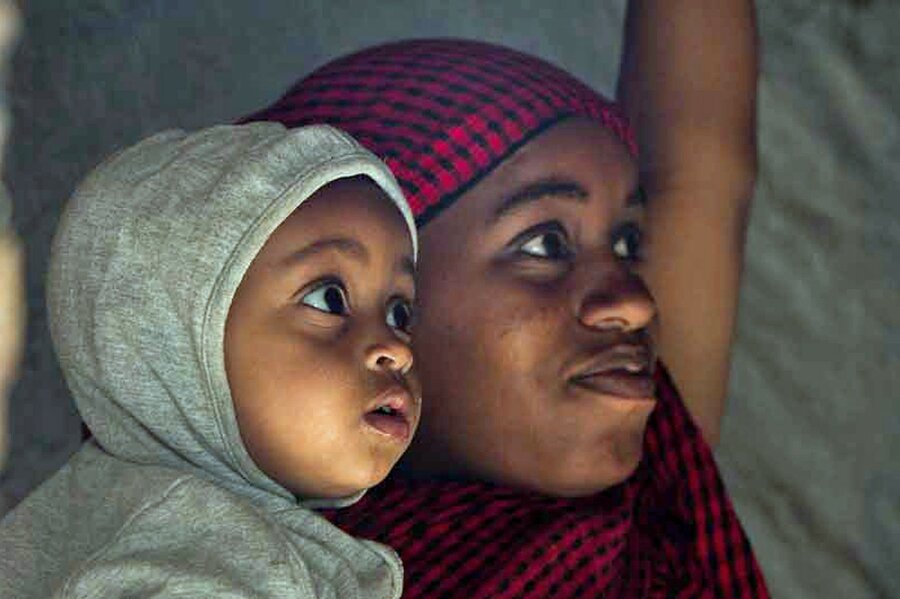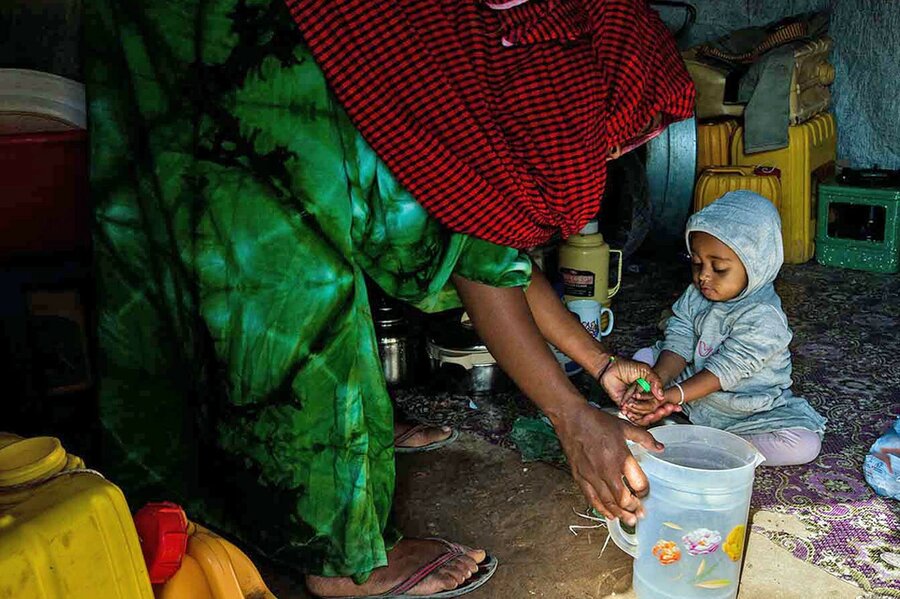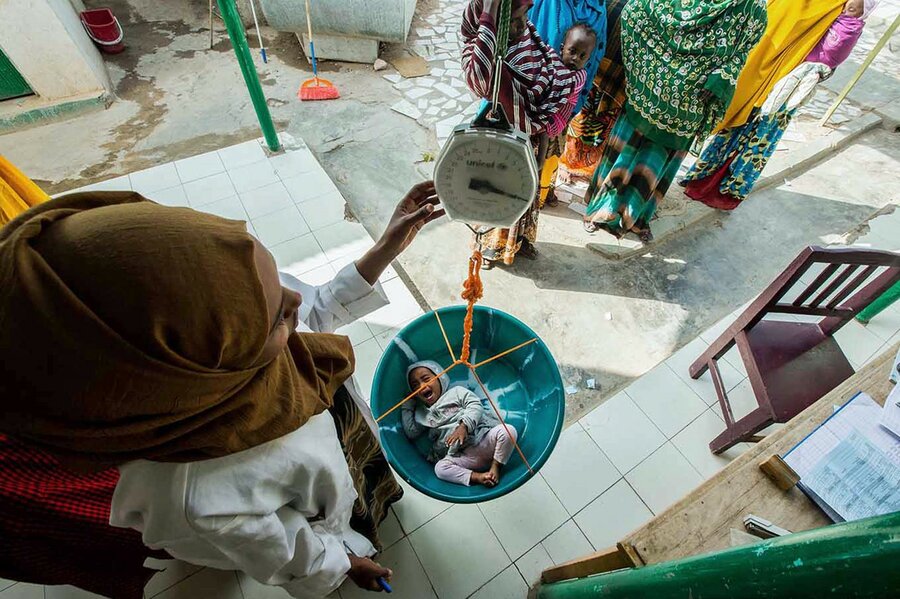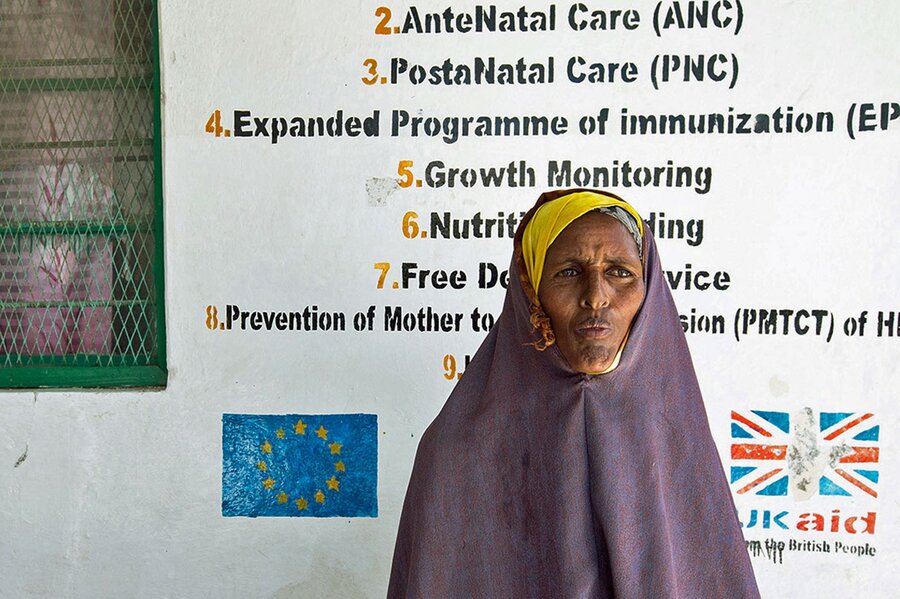As Drought Intensifies, WFP Provides Life-Saving Support to Mothers and Children in Somalia
Food security and nutrition in Somalia is deteriorating sharply as drought spreads. The World Food Programme (WFP) and other humanitarian partners have a critical window to respond to growing needs in order to avert a possible famine. WFP has already mobilized its team on the ground, with its response including nutritional assistance for children under age 5, pregnant women and nursing mothers. We take a closer look.

Twenty-year old Ruman Mohamed gently puts down her 11-month old daughter, Obah. She fills a small metal bowl with water from a plastic pitcher, then dips her daughter's hands inside, rubbing them clean.
"I learned to do that at the centre," Ruman says, pointing to her daughter's hands and referring to the Mother and Child Health and Nutrition (MCHN) centre she had visited in the morning, ten minutes' walk from her hut in Hargeisa City in northwestern Somalia.
From a plastic bag at her feet, Ruman pulls out a sachet with the letters ‘RUSF' — ready-to-use supplementary food. She kneads the sachet with one hand then tears off the corner with the other, before handing it to her daughter, who puts it straight to her mouth and starts sucking out the smooth brown paste.

With big inquisitive eyes and full round cheeks, it isn't obvious that Obah is moderately malnourished. Her daily ration of RUSF — a peanut-based nutrition supplement rich in essential fats and fortified with vitamins and minerals — is part of a four-month treatment by WFP to address malnutrition in children under 5. After the first month, the weighing scale at the MCHN centre that morning showed that Obah had put on 200 grams — one sign that the treatment is working so far.
Malnutrition on the rise
In Somalia, some 363,000 children under 5 are malnourished, of whom 71,000 are severely malnourished and face a high risk of disease and death. With severe drought conditions prevailing in the country, it is estimated that 6.2 million Somalis, more than half the country's population, are facing food insecurity. Of this number, close to 3 million are unable to meet their daily food requirements and are in dire need of life-saving assistance. The alarming food-insecurity levels in the country mean that without immediate food and nutrition support, malnutrition rates for children and adults alike could rise.

An hour after Ruman and Obah leave the MCHN centre, 40-year-old Saado Abokor Warsame sits quietly as a nutrition health worker checks her for malnutrition. Saado's jilbab (veil) only shows her sunken eyes and gaunt cheeks. Her tall but frail body gives no suggestion that she is actually close to 9-months pregnant. The indicators show what the nutrition health worker had already suspected — Saado is malnourished.
Saado is a new arrival at the centre. To get to Hargeisa, her sister had to send money for her and her four children to make the 100-kilometre journey from her village. Her husband stayed behind to look after what was left of their worldly assets: four cows. The drought has already claimed 11 cows and 100 of their goats. With almost no means to produce or buy food, Saado said she and her children had no choice but to leave their home.
Unabated drought
Consecutive failed rainy seasons in Somalia have left pastureland in the north barren and caused a major drop in crop yields in the south. Officials say that most pastoralists have lost at least half their livestock to disease or starvation. This has prompted thousands of people in search of food and water to move east to Puntland or westward to towns, and even into neighboring Ethiopia. As more people arrive in Hargeisa and towns close by, already stretched resources risk being overwhelmed.
This has meant that Saado's situation is only marginally better than it was at home. Her sister and her family are already struggling every day to find work and buy food. Meals consist mostly of rice, with no meat or vegetables. "We share food with my sister's family," said Saado, "But I know we are a burden."

Following Saado's health assessment at the MCHN centre, she is enrolled in WFP's nutrition programme for pregnant and nursing mothers. Until she gives birth and her baby reaches 6 months, she will receive counselling during pre and ante-natal care, plus a monthly provision of supplementary fortified food to protect her from malnutrition and ensure that she is able to nurse her baby.
WFP is assisting young mothers and children with nutrition programmes in over 930 MCHN centres across Somalia. In many centres, WFP works together with UNICEF, which treats severe acute malnutrition, while WFP addresses moderate acute malnutrition. With the United Nations warning of a risk of famine, these centres and others like it are just one of the critical ways that the international community can urgently and effectively address the impacts of the severe drought on the health of women and small children.
WFP urgently needs US$ 374 million in order to cover the additional needs for more than 2 million people in need of life-saving food assistance, and to provide specialized nutrition support to mothers and children.
Want to play your part in helping WFP tackle hunger? DONATE NOW.
— Story by Mireille Ferrari and Abdullahi Abdi.


